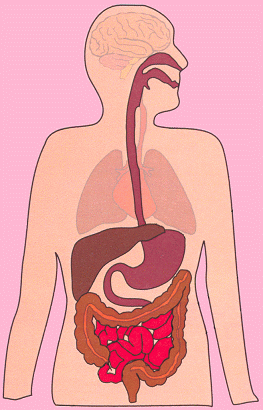|
The digestive system is composed of the gastrointestinal (GI) tract
and organs such as the liver, pancreas, and gallbladder.
The GI tract is made up of hollow organs, including:
the mouth, esophagus, stomach, small intestine, large intestine, and rectum.
All of these organs have a role in helping the body digest food. Bacteria in the GI tract helps break down food. The nervous system and the circulatory system also aid in the process. Together, nerves, hormones, bacteria, blood, and the organs of the digestive system complete the complex task of digesting the foods and liquids a person consumes each day. The digestive system is important for breaking down food into nutrients; the body then uses these nutrients for energy, growth, and cell repair. Each form of nutrients-- carbohydrates, proteins, fats, and vitamins-- all serve a different purpose. Without the digestive system, there would be no way for the body to absorb these. |
 |